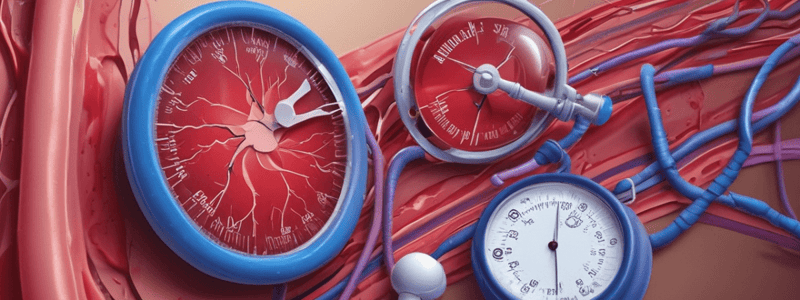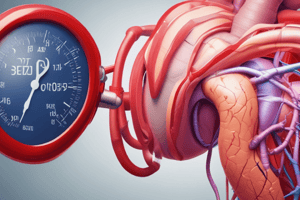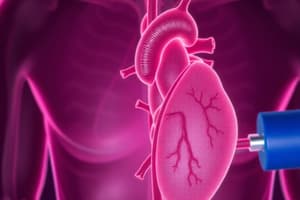Podcast
Questions and Answers
What is the primary role of the nervous system in short-term blood pressure regulation?
What is the primary role of the nervous system in short-term blood pressure regulation?
- Altering fluid balance to adjust blood volume
- Activating the renin-angiotensin-aldosterone system (RAAS)
- Modulating the heart rate and contractility through reflexes (correct)
- Regulating kidney function to maintain long-term blood pressure
Which of the following is NOT a component of the short-term nervous system regulation of blood pressure?
Which of the following is NOT a component of the short-term nervous system regulation of blood pressure?
- Abdominal compression reflex
- Renin-angiotensin-aldosterone system (RAAS) (correct)
- Arterial chemoreceptor reflex
- Arterial baroreceptor reflex
How do baroreceptors respond to an increase in arterial blood pressure?
How do baroreceptors respond to an increase in arterial blood pressure?
- They increase their firing rate, stimulating the cardiac acceleration center to increase heart rate and contractility
- They decrease their firing rate, inhibiting the cardiac acceleration center and decreasing sympathetic tone
- They decrease their firing rate, inhibiting the cardiac inhibitory center and decreasing vagal tone
- They increase their firing rate, stimulating the cardiac inhibitory center to decrease heart rate (correct)
What is the primary function of the renin-angiotensin-aldosterone system (RAAS) in blood pressure regulation?
What is the primary function of the renin-angiotensin-aldosterone system (RAAS) in blood pressure regulation?
What is the role of the kidney in the long-term regulation of arterial blood pressure?
What is the role of the kidney in the long-term regulation of arterial blood pressure?
Which of the following is NOT a type of hypertension?
Which of the following is NOT a type of hypertension?
What is the primary difference between primary (essential) and secondary hypertension?
What is the primary difference between primary (essential) and secondary hypertension?
Which of the following is a key mechanism by which the kidney regulates long-term blood pressure?
Which of the following is a key mechanism by which the kidney regulates long-term blood pressure?
Which of the following is not one of the long-term regulatory systems for arterial blood pressure?
Which of the following is not one of the long-term regulatory systems for arterial blood pressure?
What is the primary effect of angiotensin II on the body?
What is the primary effect of angiotensin II on the body?
How does Antidiuretic Hormone (ADH) help regulate long-term arterial blood pressure?
How does Antidiuretic Hormone (ADH) help regulate long-term arterial blood pressure?
What is the primary stimulus for the release of Atrial Natriuretic Peptide (ANP)?
What is the primary stimulus for the release of Atrial Natriuretic Peptide (ANP)?
What percentage of hypertension cases are classified as primary (essential or idiopathic) hypertension?
What percentage of hypertension cases are classified as primary (essential or idiopathic) hypertension?
What is the definition of hypertension?
What is the definition of hypertension?
Which of the following is not a cause of Antidiuretic Hormone (ADH) release?
Which of the following is not a cause of Antidiuretic Hormone (ADH) release?
How does Atrial Natriuretic Peptide (ANP) help regulate long-term arterial blood pressure?
How does Atrial Natriuretic Peptide (ANP) help regulate long-term arterial blood pressure?
What is the first mechanism mentioned for the intermediate-term regulation of arterial blood pressure?
What is the first mechanism mentioned for the intermediate-term regulation of arterial blood pressure?
Which enzyme converts angiotensin I into angiotensin II?
Which enzyme converts angiotensin I into angiotensin II?
What is the effect of angiotensin II on arterial blood pressure?
What is the effect of angiotensin II on arterial blood pressure?
What is the second mechanism mentioned for the intermediate-term regulation of arterial blood pressure?
What is the second mechanism mentioned for the intermediate-term regulation of arterial blood pressure?
What is the effect of an increase in blood volume on arterial blood pressure according to the capillary fluid shift mechanism?
What is the effect of an increase in blood volume on arterial blood pressure according to the capillary fluid shift mechanism?
What is the third mechanism mentioned for the intermediate-term regulation of arterial blood pressure?
What is the third mechanism mentioned for the intermediate-term regulation of arterial blood pressure?
Which of the following is NOT mentioned as a long-term regulation mechanism for arterial blood pressure?
Which of the following is NOT mentioned as a long-term regulation mechanism for arterial blood pressure?
What is the effect of an increase in blood pressure according to the stress relaxation mechanism?
What is the effect of an increase in blood pressure according to the stress relaxation mechanism?
What is the main reason for the lack of increase in baroreceptor discharge in chronic hypertension?
What is the main reason for the lack of increase in baroreceptor discharge in chronic hypertension?
Where are the arterial chemoreceptors located?
Where are the arterial chemoreceptors located?
What is the effect of a decrease in arterial blood pressure below 60 mmHg on the peripheral chemoreceptors?
What is the effect of a decrease in arterial blood pressure below 60 mmHg on the peripheral chemoreceptors?
What is the purpose of the CNS ischemic response when arterial blood pressure drops below 60 mmHg?
What is the purpose of the CNS ischemic response when arterial blood pressure drops below 60 mmHg?
How does the abdominal compression reflex help regulate arterial blood pressure?
How does the abdominal compression reflex help regulate arterial blood pressure?
What is the primary difference between the short-term and intermediate-term regulation of arterial blood pressure?
What is the primary difference between the short-term and intermediate-term regulation of arterial blood pressure?
What is the primary function of the carotid and aortic bodies in the regulation of arterial blood pressure?
What is the primary function of the carotid and aortic bodies in the regulation of arterial blood pressure?
What is the main purpose of the intermediate-term regulation of arterial blood pressure?
What is the main purpose of the intermediate-term regulation of arterial blood pressure?
In a patient with stenosis of both renal arteries, leading to severely decreased blood flow to the renal arterioles, what effect would this have on blood pressure?
In a patient with stenosis of both renal arteries, leading to severely decreased blood flow to the renal arterioles, what effect would this have on blood pressure?
If a medication inhibits an enzymatic process that occurs in the lungs, which step of the RAAS pathway is most directly inhibited?
If a medication inhibits an enzymatic process that occurs in the lungs, which step of the RAAS pathway is most directly inhibited?
Which of the following is primarily responsible for short-term regulation of blood pressure?
Which of the following is primarily responsible for short-term regulation of blood pressure?
Which of the following is the primary mechanism for long-term regulation of blood pressure?
Which of the following is the primary mechanism for long-term regulation of blood pressure?
Which of the following is a common secondary cause of hypertension?
Which of the following is a common secondary cause of hypertension?
What is the primary function of aldosterone in the regulation of blood pressure?
What is the primary function of aldosterone in the regulation of blood pressure?
Which of the following conditions is characterized by an increased red blood cell mass, potentially leading to increased blood viscosity and hypertension?
Which of the following conditions is characterized by an increased red blood cell mass, potentially leading to increased blood viscosity and hypertension?
What percentage of all hypertension cases are classified as secondary hypertension?
What percentage of all hypertension cases are classified as secondary hypertension?
Flashcards are hidden until you start studying




